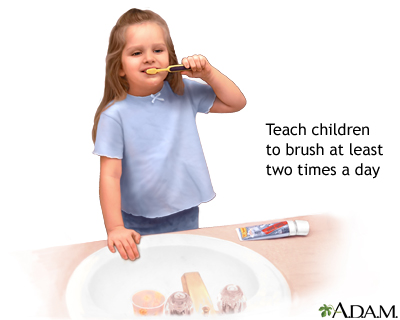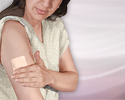Healthy living
Healthy habitsGood health habits can allow you to avoid illness and improve your quality of life. The following steps will help you feel better and live better.
- Get regular exercise and control your weight.
- Don't smoke.
- Do NOT drink a lot of alcohol. Avoid alcohol completely if you have a history of alcoholism.
- Use the medicines your health care provider recommends as directed.
- Eat a balanced and healthy diet.
- Take care of your teeth.
- Manage high blood pressure.
- Follow good safety practices.
EXERCISE
Exercise is a key factor in staying healthy. Exercise strengthens the bones, heart, and lungs, tones muscles, improves vitality, relieves depression, and helps you sleep better.
Talk to your provider before starting an exercise program if you have health conditions such as obesity, high blood pressure, or diabetes. This can help ensure that your exercise is safe and that you get the most of out of it.
SMOKING
Cigarette smoking is the main preventable cause of death in the United States. One out of every 5 deaths each year is either directly or indirectly caused by smoking.
Secondhand cigarette smoke exposure can cause lung cancer in nonsmokers. Secondhand smoke is also linked to heart disease.
It is never too late to quit smoking. Talk to your provider or nurse about medicines and programs that can help you quit.
ALCOHOL USE
Drinking alcohol changes many brain functions. Emotions, thinking, and judgment are first to be affected. Continued drinking will affect motor control, causing slurred speech, slower reactions, and poor balance. Having a higher amount of body fat and drinking on an empty stomach will speed up the effects of alcohol.
Alcoholism can lead to many problems including:
- Diseases of the liver and pancreas
- Cancer and other diseases of the esophagus and digestive tract
- Heart muscle damage
- Brain damage
- Serious harm to your unborn baby if you are pregnant including fetal alcohol syndrome. Do NOT drink alcohol when you are pregnant.
Parents should talk to their children about the dangerous effects of alcohol. Talk to your provider if you or someone close to you has a problem with alcohol. Many people whose lives have been affected by alcohol benefit from taking part in an alcohol support group.
DRUG AND MEDICINE USE
Drugs and medicines affect people in different ways. Always tell your provider about all the drugs and medicines you are taking. This includes over-the-counter medicines and vitamins.
- Drug interactions can be dangerous.
- Older people need to be very careful about interactions when they are taking many medicines.
- All of your providers should know all the medicines you are taking. Carry the list with you when you go for checkups and treatments.
- Avoid drinking alcohol while taking medicines. This can cause serious problems. The combination of alcohol and tranquilizers or painkillers can be deadly.
Pregnant women should not take any drug or medicine without talking to their provider. This includes over-the-counter medicines. The unborn baby is even more sensitive to the harm from drugs in the first 3 months. Tell your provider if you have been taking any drugs just before becoming pregnant.
Always take medicines as prescribed. Taking any medicine in a way other than prescribed or taking too much can cause serious health problems. It is considered drug abuse. Abuse and addiction are not just associated with illegal "street" drugs.
Legal drugs such as laxatives, painkillers, nasal sprays, diet pills, and cough medicines can also be misused.
Addiction is defined as continuing to use a substance even though you are experiencing problems related to the use. Simply needing a drug (such as a painkiller or antidepressant) and taking it as prescribed is not addiction.
DEALING WITH STRESS
Stress is normal. It can be a great motivator and help in some cases. But too much stress can cause health problems such as trouble sleeping, stomach upset, anxiety, and mood changes.
- Learn to recognize the things most likely to cause stress in your life.
- You may not be able to avoid all stress but knowing the source can help you feel in control.
- The more control you feel you have over your life, the less damaging the stress in your life will be.
OBESITY
Obesity is a serious health concern. Excess body fat can overwork your heart, bones, and muscles. It can also increase your risk for developing high blood pressure, stroke, varicose veins, breast cancer, and gallbladder disease.
Obesity can be caused by eating too much and eating unhealthy foods. Lack of exercise also plays a part. Family history may be a risk for some people as well.
DIET
Having a balanced diet is important to being in good health.
- Choose foods that are low in saturated and trans fat, and low in cholesterol.
- Limit your intake of sugar, salt (sodium), and alcohol.
- Eat more fiber, which can be found in fruits, vegetables, beans, whole grain products, and nuts.
TOOTH CARE
Good dental care can help you keep your teeth and gums healthy for a lifetime. It is important for children to begin good dental habits when they are young. For proper dental hygiene:
- Brush your teeth twice a day and floss at least once daily.
- Use fluoride toothpaste.
- Get regular dental checkups.
- Limit sugar intake.
- Use a toothbrush with soft bristles. Replace your toothbrush when bristles get bent.
- Have your dentist show you the proper ways to brush and floss.
References
Mora S, Libby P, Ridker PM. Primary prevention of cardiovascular disease. In: Libby P, Bonow RO, Mann DL, Tomaselli GF, Bhatt DL, Solomon SD, eds. Braunwald's Heart Disease: A Textbook of Cardiovascular Medicine. 12th ed. Philadelphia, PA: Elsevier; 2022:chap 25.
US Preventive Services Task Force. Behavioral counseling interventions to promote a healthy diet and physical activity for cardiovascular disease prevention in adults with cardiovascular risk factors: US Preventive Services Task Force recommendation statement. JAMA. 2020;324(20):2069-2075. PMID: 33231670 pubmed.ncbi.nlm.nih.gov/33231670/.
US Preventive Services Task Force. Screening and interventions to prevent dental caries in children younger than 5 years: US Preventive Services Task Force recommendation statement. JAMA. 2021;326(21):2172-2178. PMID: 34874412 pubmed.ncbi.nlm.nih.gov/34874412/.
US Preventive Services Task Force. Interventions for tobacco smoking cessation in adults, including pregnant persons: US Preventive Services Task Force recommendation statement. JAMA. 2021;325(3):265-279. PMID: 33464343 pubmed.ncbi.nlm.nih.gov/33464343/.
US Preventive Services Task Force. Screening for unhealthy drug use: US Preventive Services Task Force recommendation statement. JAMA. 2020;323(22):2301-2309. PMID: 32515821 pubmed.ncbi.nlm.nih.gov/32515821/.
US Preventive Services Task Force. Screening and behavioral counseling interventions to reduce unhealthy alcohol use in adolescents and adults: US Preventive Services Task Force recommendation statement. JAMA. 2018;320(18):1899-1909. PMID: 30422199 pubmed.ncbi.nlm.nih.gov/30422199/.





















